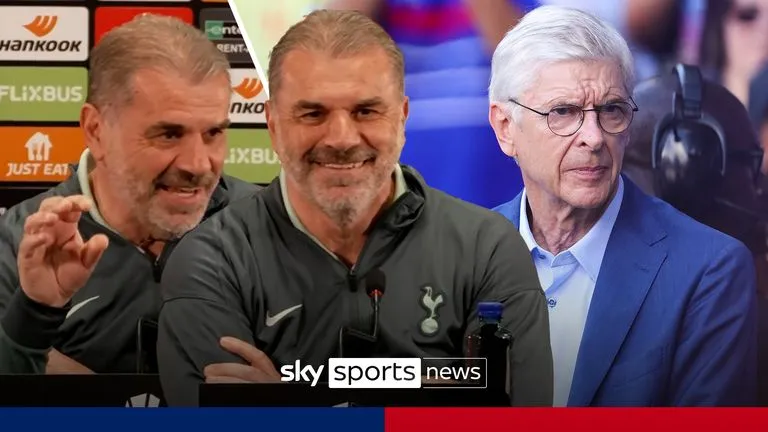Spurs Madness and UEFA’s Champions League: A New Era for Premier League Clubs?
The UEFA Champions League has long been regarded as the pinnacle of club football, showcasing the best teams from across Europe. With the recent performances of Premier League clubs, particularly Tottenham Hotspur, the anticipation around this season has reached new heights. Under the fresh management of Ange Postecoglou, Spurs have not only shifted the narrative around their club but also reinvigorated discussions concerning the Premier League’s representation in the Champions League.
‘Spurs Do Crazy Things to People’
As the new manager of Tottenham Hotspur, Ange Postecoglou has taken on the challenging task of not only delivering results on the pitch but also addressing the mental and emotional whirlwind that often accompanies life at Spurs. Recently, commenting on the club’s impact on its players and management, he quipped, ‘Spurs does crazy things to people.’ This remark has resonated particularly well with fans, who have seen their club oscillate through highs and lows over the years.
Postecoglou’s candidness about the pressures and inherent complexities of managing at Spurs reflects his awareness of the club’s tumultuous history, and it may also signify a shift towards a more transparent and resilient culture within the team. By acknowledging the crazy nature of the club, he paves the way for an open dialogue with supporters that can create a sense of unity amid uncertainties.
Wenger’s Perspective: Spurs Drive Fans Mad
Former Arsenal manager Arsène Wenger weighed in on the topic, extending Postecoglou’s comments by arguing that the very essence of Spurs can indeed drive people mad. Wenger’s willingness to engage in playful banter highlights an enduring rivalry—one that has been defined by competitive spirit over decades.
Wenger’s remarks echo the frustrations felt by fans and players alike who have seen Spurs falter in key moments, often leaving them on the brink of success only to fall short. This rollercoaster of emotions has arguably defined the identity of Tottenham Hotspur. In a league dominated by champions and the pursuit of glory, the quest for stability and recognition can often leave a mark, particularly in a club synonymous with near-misses.
Could There Be Six Premier League Clubs in the Champions League?
One of the most eye-catching discussions emerging from the current football climate is the potential for six Premier League teams to qualify for the UEFA Champions League. With the English top flight boasting a wealth of talent and vibrant competition, the prospect of extended representation in Europe’s elite tournament is exciting for fans and stakeholders alike.
This season, the likes of Manchester City, Liverpool, Chelsea, Arsenal, and Manchester United are expected to put forth serious challenges for the Champions League trophy. Yet, Tottenham’s resurgent form under Postecoglou might allow them to join this elite group, creating an unprecedented scenario where six clubs from the Premier League could secure spots in Europe’s most coveted tournament.
The Current Landscape of European Football
The history of English clubs in the Champions League demonstrates their capacity to compete on the continental stage. Clubs like Manchester City have established themselves as modern powerhouses, overcoming previous barriers to reach multiple finals and ultimately winning the coveted trophy in recent years. The deep pockets of Premier League clubs, combined with a thriving football culture, ideally position them to dominate Europe.
With new rules for Champions League qualification, the assurance of further spots for clubs outside of traditional powerhouses adds to the contention. As other European leagues facing various challenges, English clubs have emerged as the formidable force they are today. This opportunity not only showcases talent but also broadens the international appeal of the Premier League, attracting global talent and creating a thriving competitive environment.
Analyzing Spurs’ Position
For Spurs, their position in this ambitious landscape may feel like déjà vu for fans accustomed to teetering on the edge of greatness. Postecoglou’s approach, which marries tactical acumen with an emphasis on mental fortitude, is central to ensuring that Spurs not only compete but thrive.
With players such as Son Heung-min and Harry Kane showcasing exceptional abilities both domestically and internationally, their efforts could galvanize the team to achieve the coveted Champions League spot if their performances remain consistent this season.
Will Spurs Break the Cycle?
With the weight of expectation now firmly resting on the shoulders of Postecoglou, the question remains—can Spurs break the cycle of near-misses and heartbreaks? There’s little doubt that the presence of passionate fans, relentless talent, and Postecoglou’s strategic nous provide a glimmer of hope for the club’s resurgence.
Spurs have a storied history embedded in a love for attacking football; Postecoglou needs to build a side that can not only attract admiration but also deliver results. If he successfully continues the momentum of the current season, and the club dispels the ‘curse’ of their previous iterations, Spurs may find themselves not only qualifying for the Champions League but making a deep run.
The Bigger Picture: A Cohesive League
While the focus is on individual clubs, the discussion of potentially six Premier League teams in the Champions League reflects an exciting chapter for English football overall. Bringing so many clubs into the mix for a prestigious competition will undoubtedly bolster the reputation of the Premier League and promote an intense competitive spirit.
This development recognizes the strength of English football. As clubs invest in infrastructure, youth development, and scouting, they are poised to leave a mark not only in Europe but worldwide. The anticipation surrounding this season is palpable, with fans eager to see how these storylines unfold.
Conclusion
The passion of football lies not only in the glory of triumph but in the stories of resilience, chaos, and the human spirit. As case studies continue to emerge from top-flight English football, clubs like Tottenham Hotspur have the inherent ability to inspire as they navigate adversity and celebrate success. Whether Spurs can ultimately usher in a new era worthy of their club’s illustrious legacy remains to be seen. But one thing’s for sure: football in the Premier League is crazier than ever.







